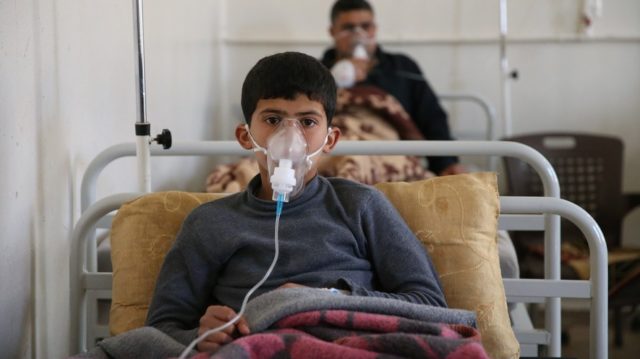
Chemical weapons have been outlawed since the Hague Declaration in 1899 because the world had generally agreed that they are uniquely hideous and terrifying. The 1919 Treaty of Versailles and the 1925 Geneva Protocol were reiterations of what had been one of the world’s few consensus points. German use of chemicals in the Nazi Holocaust was so profoundly loathsome that to this day Nazis are prosecuted and punished. In 2016, Reinhold Hanning, A 94-year-old former Auschwitz death camp guard was convicted as an accessory to the murder of 170,000 people. In 2017, 96-year-old Oskar Groening, a former Nazi guard and SS officer, was deemed fit to serve jail time for his crimes.
On January 22 and February 1, 2018, the Syrian government with at least the tacit support of its allies Russia and Iran, subjected the rebel controlled Syrian city of Douma to chemical attacks – it wasn’t the first time, but this time there are side stories from Germany and Iran.
According to the German newspaper Bild, the German Federal Office for Economic Affairs and Export Control approved a license for the Krempel company to sell electronic press boards to Iranian companies in 2016. Reporting the story, The Jerusalem Post said the technology was used in rockets in Syria that delivered the abovementioned chemical weapons. Photos at the investigative site Bellingcat showed parts reportedly from the Douma attack bearing a “Made in Germany” label. The images were collected by the organization Syrians for Truth and Justice.
Okay, that sounds speculative, perhaps, but a Krempel Group spokesman didn’t deny it, recognizing its product and telling Bild that the company was “shocked… that its Pressspan PSP-3040 apparently was used in motors that were applied to weapons of war.”
Since the 2015 JCPOA Germany, has been Iran’s largest European trading partner: 2.9 billion euros in 2016 according to the German government and 3.6 billion euros in 2017. Interestingly, the trade goes only one way: in 2016, Germany exported 2.6 billion euros worth to Iran and took back only 300 million euros. According to Deutsche Welle, Germany sends machinery and equipment, cars, chemicals, pharmaceuticals and medical products, and takes back dried fruits, pistachios, rugs and industrial raw materials.
Machinery and equipment and chemicals? What could go wrong?
Iran’s attempts to circumvent United Nations and U.S. sanctions in pursuit of technology to advance its military systems — nuclear and conventional — are also well known. As far back as 2005, the British publication Jane’s Defence Weekly reported that Iran was working with Syria to build an “innovative chemical warfare program.” Iran’s role was to build the necessary equipment.
Chemical weapons were first used in the Syrian civil war in 2013, but President Barack Obama ignored his own stated “red line” and declined to retaliate against the regime. The Russians vetoed a Security Council Resolution condemning Syria, and David Cameron became the first British Prime Minister to lose a war vote in Parliament since 1792. In the absence of any better idea, the U.S. followed the Russian lead in producing a “diplomatic” solution in 2014 under which the Syrian dictator Bashar Assad declared his stockpiles, the Russians put them aboard American vessels and the U.S. destroyed them at sea.
The Jewish Policy Center wrote at the time:
The Obama administration crowed over what it called a watershed moment in the Syrian conflict.”
[The administration] acknowledged that it wasn’t quite the whole Syrian stockpile – after all, OPCW was relying on a self-declared Syrian arsenal. But OPCW (the Organization for the Prevention of Chemical Weapons) was willing to swear that the President’s optimism was warranted. In a remarkably precise statement, Sigrid Kaag, special coordinator for OPCW-U.N., said 96% percent of Syria’s declared chemical weapons were destroyed. Not 95% or 87% or 43.5%, but 96% on the nose.
By August, the administration claimed that the Syrian munitions had been “fully destroyed” but acknowledged that the munitions factories had not been dismantled as required by the agreement. According to U.N. Secretary General Ban Ki Moon, at least one of 12 storage facilities remained open, and only 5 of 18 production facilities had been closed.
After a 2017 Syrian chemical attack on a civilians that killed an estimated 80 people, President Donald Trump ordered a retaliatory strike against the air base from which the attack had come. The facility was disabled, but the latest attacks in Douma clearly indicate that he did not succeed in restoring deterrence.
As long as Western countries are willing to supply the means of lethal production, we will always be in “catch-up” mode. Companies will always declare themselves “shocked” to discover that their military-capable machines and processes have been used for military purposes – and further “shocked” that their clients and their clients’ friends are killers.

